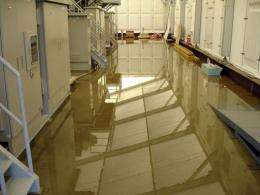Japan plant operator mulls new nuclear water dump

Japan's embattled Tokyo Electric Power Co. said Thursday it was considering dumping more nuclear-contaminated water from the Fukushima power plant into the sea.
If TEPCO goes ahead with the plan it would be the second time it has deliberately released radiation-tainted water into the ocean since reactors began melting down at Fukushima in the wake of the March 11 tsunami.
"We have stored processed water in tanks, which are expected to become full by March next year," said a TEPCO spokesman.
He said no final details -- such as when, how much, or how dirty the water would be -- have been established, but stressed the water would be filtered to reduce levels of radioactivity before it was dumped.
Thousands of tonnes of water have been pumped into reactors at Fukushima in an effort to cool the molten nuclear fuel and bring the plant to a safe shutdown.
"We are studying a variety of measures to cope with it," he said, including the possibility of building more storage tanks.
"The company has consulted with the Japan Fisheries (JF) Cooperatives about the possibility of a water release," he said.
A group of fishermen immediately lodged a protest with TEPCO and the Economy, Trade and Industry Ministry on Thursday, demanding the plan be shelved.
"Many local fishermen still cannot go out to sea due to regulations or voluntary decisions and the now-poor safety reputation of the area has scared off consumers," JF official Shinji Ogawa told AFP.
"We cannot possibly let TEPCO do this again," he added.
Within weeks of the world's worst nuclear crisis since Chernobyl, TEPCO dumped more than 10,000 tons of low-level radioactive water into the Pacific.
Subsequent reports have found the radiation was widely dispersed and did not pose a threat to human or animal life.
But Ogawa said the water release plan was outrageous, especially after the power company had to apologise this week for accidentally leaking highly radioactive waste water into the Pacific.
TEPCO said Monday that it believed 150 litres (40 US gallons) of waste water including highly harmful strontium, a substance linked to bone cancers, has found its way into the open ocean.
The leak was believed to contain 26 billion becquerels of radioactive materials, a level the company insisted was not dangerous, even for people who consumed seafood caught in the area every day.
(c) 2011 AFP



















